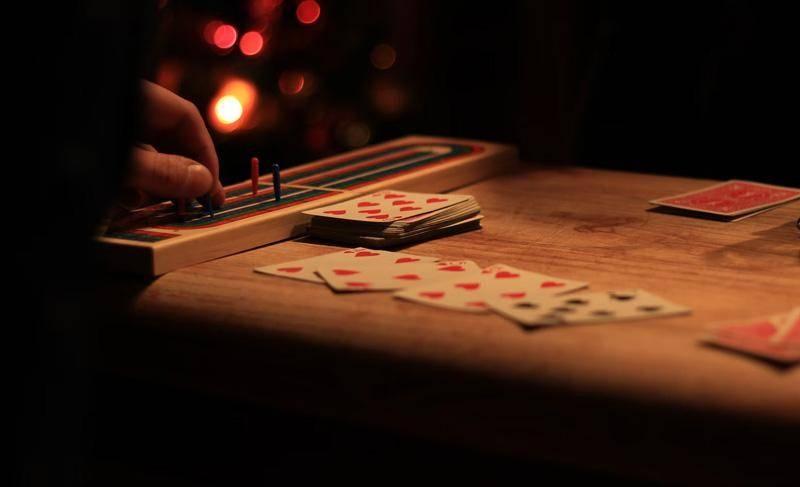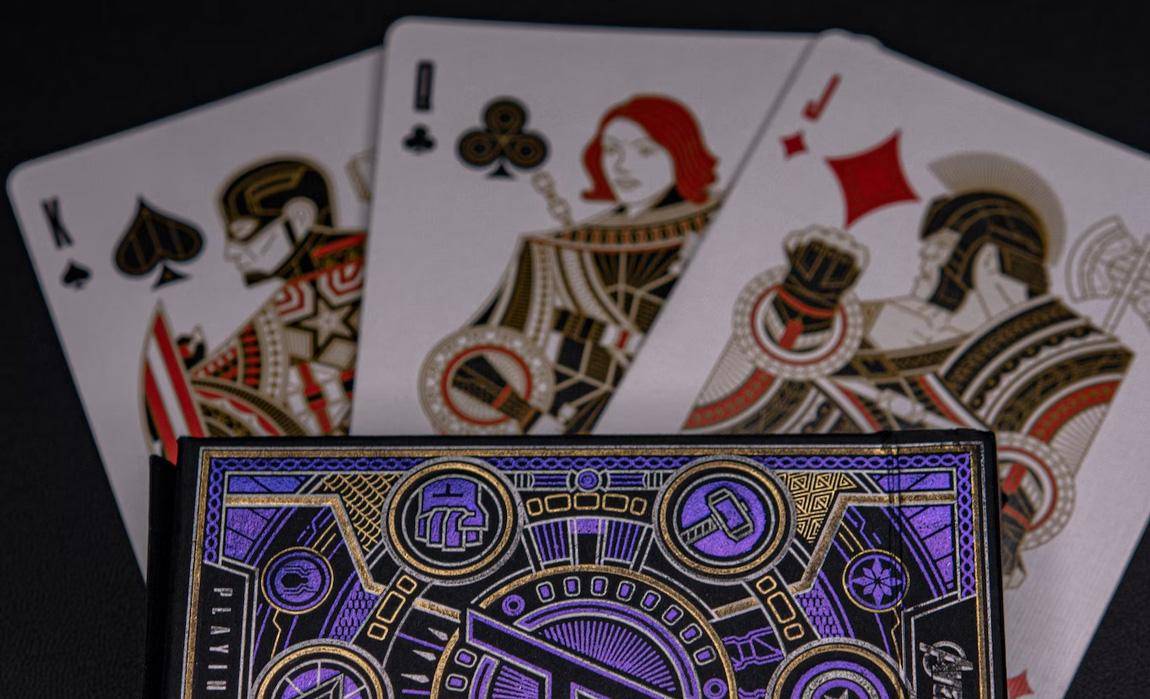Going out to bars, grilling steaks, touring distilleries, and hanging around the campfire are all great ideas for things to do on your next guys getaway but what about playing a card game other than poker? While this might not seem like the most masculine of pastimes, the reality is that for centuries men have been playing card games as a way to pass time, relax, and having something to do while discussing important topics. Now it's your turn to follow in these footsteps, so here's three different two-player card games that we think you'll like!
Since their first appearance in the 1370s in Europe, card games have been one of the most popular pastimes in history. Due to its versatility, many different games have been created from playing cards, each with unique rules and mechanics.
Over the centuries, the number of games people have invented with playing cards has gone from hundreds to thousands worldwide. These games eventually evolved; some even gained new variants with tweaked rules and mechanics.
Today, people still use playing cards for popular casino games like poker, baccarat, and casual games like solitaire and hearts. While these games are vastly popular among seasoned gamblers and casual at-home players, many argue that nothing beats classic competitive two-player card games.
Two-player card games are an excellent way to pass the time with a loved one or friend, improve your dueling skills, and sharpen your mind. This article will explore the top 3 two-player card games that will provide you and your opponent with hours of entertainment and fun.
War
Starting the list with the most straightforward and fast-paced entry, War is the perfect two-player game for people who only want to play quick rounds. The game requires more luck than skill because your win condition ultimately relies on drawing the right card from the top of the pile.
The Setup
The game setup requires a standard deck of 52 cards, and the game’s objective is to collect all the cards in the deck. To start the game, shuffle the standard 52-card deck with two jokers included, then evenly deal out the entire deck between both players.
The Rules and Gameplay
Both players start by flipping the top card of their respective decks face-up in front of them. The players must then compare both face-up cards, and the player with the highest ranking card takes both cards to their personal face-up discard pile.
Each player then continues flipping the top card of their respective decks or piles, following the same process. The card ranking hierarchy has the Joker as the highest, followed by Ace, King, and so on, with two as the lowest.
If a player depletes the cards in their deck, they must turn their collected cards in their face-up discard pile face-down and reshuffle. Those reshuffled cards serve as the new deck, and the player continues playing with that new deck like normal.
If both players flip cards of the same rank, that is called a "war." During a war, players must place three cards staggered over the face-up card. Then each player must place a fourth card face-up on top of the three staggered cards.
Players will then compare the new face-up cards played, and the player with the highest rank takes all the cards in the War. That includes the three staggered face-down cards.
If both players tie in rank again with the new face-up cards, that initiates another war. Players must then place three staggered cards again on top of the new face-up cards and follow the same process until someone wins the War.
A player wins if their opponent cannot place cards down during War due to running out of cards to place down.

Cribbage
Cribbage is a classic playing card game with over four-hundred years of rich history since its invention by Sir John Suckling in the 1600s. The game can be played with more than two players with a few tweaks to the cribbage board and rules. However, everyone knows the best way to play Cribbage is in a classic two-player mode where each player tests their dueling skills. While luck still plays a factor in the win conditions, Cribbage requires more skill and game sense than War.
The Setup
Cribbage requires a standard deck of 52 playing cards and a cribbage board to keep track of each player's score for the setup. The game objective is to score 121 points before your opponent. If you’d like to skip the setup, sites like Cribbage-online.net make it easy to play online.
The Rules and Gameplay
To start the game, lay out the Cribbage or peg board, then place two pegs of each color into the zero spots on the board. Using a standard deck of 52 playing cards, each player cuts the deck, and the player with the lowest ranking card becomes the first dealer.
Traditionally, the dealer shuffles the deck, and the non-dealer then cuts the deck. Finally, the dealer deals six cards to each player before placing the rest of the deck on the side.
Players then pick up and look at their cards while keeping them hidden from their opponent. Each player must select two cards to discard face-down to form the crib. These four cards are placed to the side until the end of the hand.
The crib will count for the dealer during the final scoring phase at the end of a round. For each round, the current non-dealer must cut the deck so the dealer may flip the top card face-up and place it on the deck. This face-up card is known as the start card.
Starting with the non-dealer, players take turns placing one card at a time face-up in front of them, away from their opponents' face-up cards. In this game stage, each face-up card placed down has a pip value that combines with their opponents.
Players continue this process until neither can place cards down without exceeding a pip value of 31. Aces are worth 1 in pip value. Face cards amount to 10. Meanwhile, numbered cards are worth their face pip value.
If a player cannot place a card down without exceeding 31, they must declare “go.” That allows their opponent to continue playing cards without exceeding 31.
When both players can no longer place cards down without exceeding 31, the count resets to 0. The player who says “go” must then start the next round by placing a new card face-up.
The process repeats until both players no longer have cards in hand. A player can run out of cards in hand during a round, allowing the opponent to keep playing cards.
Players can bag points in the following ways:
- Your opponent declaring “go” is worth 1 point.
- Playing the last card in a round without exceeding 31 is worth 1 point.
- Playing a card that brings the total pip value to 15 or 31 is worth 2 points.
- Playing the same ranked card as the previously played card makes a pair worth 2 points.
- Playing a third card that matches the pair is a pair royal worth 6 points.
- Playing a fourth card that matches the pair royal is a double pair royal worth 12 points.
- Playing a card that continues a run of three or more cards is worth points equal to the number of cards in that run. The cards do not necessarily need to be in the exact same order, but another card must not interrupt the run.
If the dealer flips a Jack for the start card, the dealer immediately scores 2 points.
Once all cards in hand have been played, each player, starting with the non-dealer, scores points by combining the start card with their played hand. This is what Cribbage players call "the show."
The card combinations follow the same aforementioned scoring rules during the show. After the non-dealer and dealer complete their turns during the show, the dealer reveals the crib.
The crib functions as a second hand for the dealer, giving him a chance to score more points by following the same rules. After this phase of the game, the players must reshuffle the deck and reset for the next round, continuing gameplay until one player scores 121 points.
Go Fish
Capping off this list is an all-time classic that family and friends have enjoyed together for decades. Go Fish is a massively popular game that can have 2 to 10 players in a single game.
While the game's rules are relatively simplistic, it requires keen attention to everything happening in the game and luck. That means paying attention to the number of cards in hand, on the table, and remaining in the deck.
The Setup
To set up a game of Go Fish, you only need a standard deck of 52 playing cards. Shuffle the deck and deal five cards to each player to start.
Players may immediately view their cards without showing their hands to their opponent. The game objective is to build as many four-of-a-kinds as possible before the game ends.
The Rules and Gameplay
On each player's turn, they may ask if their opponent has any card ranks. For example, "James, do you have any 5s?" If the opponent (the player) has any cards of that rank in hand, they must turn them all in.
After collecting the cards from the opponent, the player may take another turn. However, if the opponent asked by the player does not have the ranked cards in hand, the opponent says, "Go fish."
The player must then draw one card from the top of the deck. If the player draws the card they requested, they must show it and take another turn. If not, they must end their turn.
Whenever a player collects all four cards of the same rank, they must immediately remove those cards from their hand. The cards removed from the hand must be placed face-up and grouped on the table in front of the player.
Whenever a player runs out of cards, they must immediately draw five cards from the deck and continue playing. When the deck is depleted, play continues until every player runs out of cards.
The game ends when both the deck and all players’ hands are empty. After the game ends, players must tally their points according to the number of four-of-a-kinds on the table.
Each four-of-a-kind equals one point, and the player with the most points wins the game.
Make One-on-One Games Fun
While playing four-player card games is ideal for game nights, it is also good to have two-player game options. Two-player card games are great when you lack players or need to kill time with a friend. The next time you and a friend need to while away the time or want to bond over cards, look no further than this list for your options.
